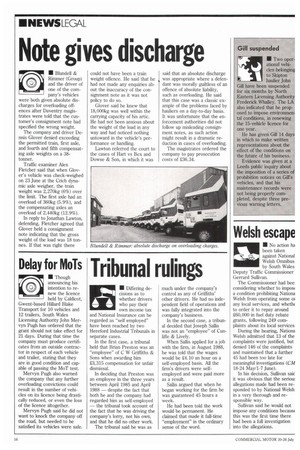Note gives discharge
Page 18

If you've noticed an error in this article please click here to report it so we can fix it.
• Blundell & Rimmer (Group) and the driver of one of the company's vehicles were both given absolute discharges for overloading offences after Daventry magistrates were told that the customer's consignment note had specified the wrong weight.
The company and driver Dennis Glover denied exceeding the permitted train, first axle, and fourth and fifth compensating axle weights on a 38tonner.
Traffic examiner Alex Fletcher said that when Glover's vehicle was check-weighed on 23 June at the Crich dynamic axle weigher, the train weight was 2,270kg (6%) over the limit. The first axle had an overload of 360kg (5.9%), and the compensating axles an overload of 2,440kg (12.9%).
In reply to Jonathan Lawton, defending, Fletcher agreed that Glover held a consignment note indicating that the gross weight of the load was 18 tonnes. If that was right there could not have been a train weight offence. He said that he had not made any enquiries about the inaccuracy of the consignment note as it was not policy to do so.
Glover said he knew that 18,000kg was well within the carrying capacity of his attic. He had not been anxious about the weight of the load in any way and had noticed nothing untoward in the vehicle's performance or handling.
Lawton referred the court to the cases of Hart vs Bex and Dowse & Son, in which it was said that an absolute discharge was appropriate where a defendant was morally guiltless of an offence of absolute liability, such as overloading. He said that this case was a classic example of the problems faced by hauliers on a day-to-day basis. It was unfortunate that the enforcement authorities did not follow up misleading consignment notes, as such action might result in a dramatic reduction in cases of overloading.
The magistrates ordered the company to pay prosecution costs of £36.34.








































































































































